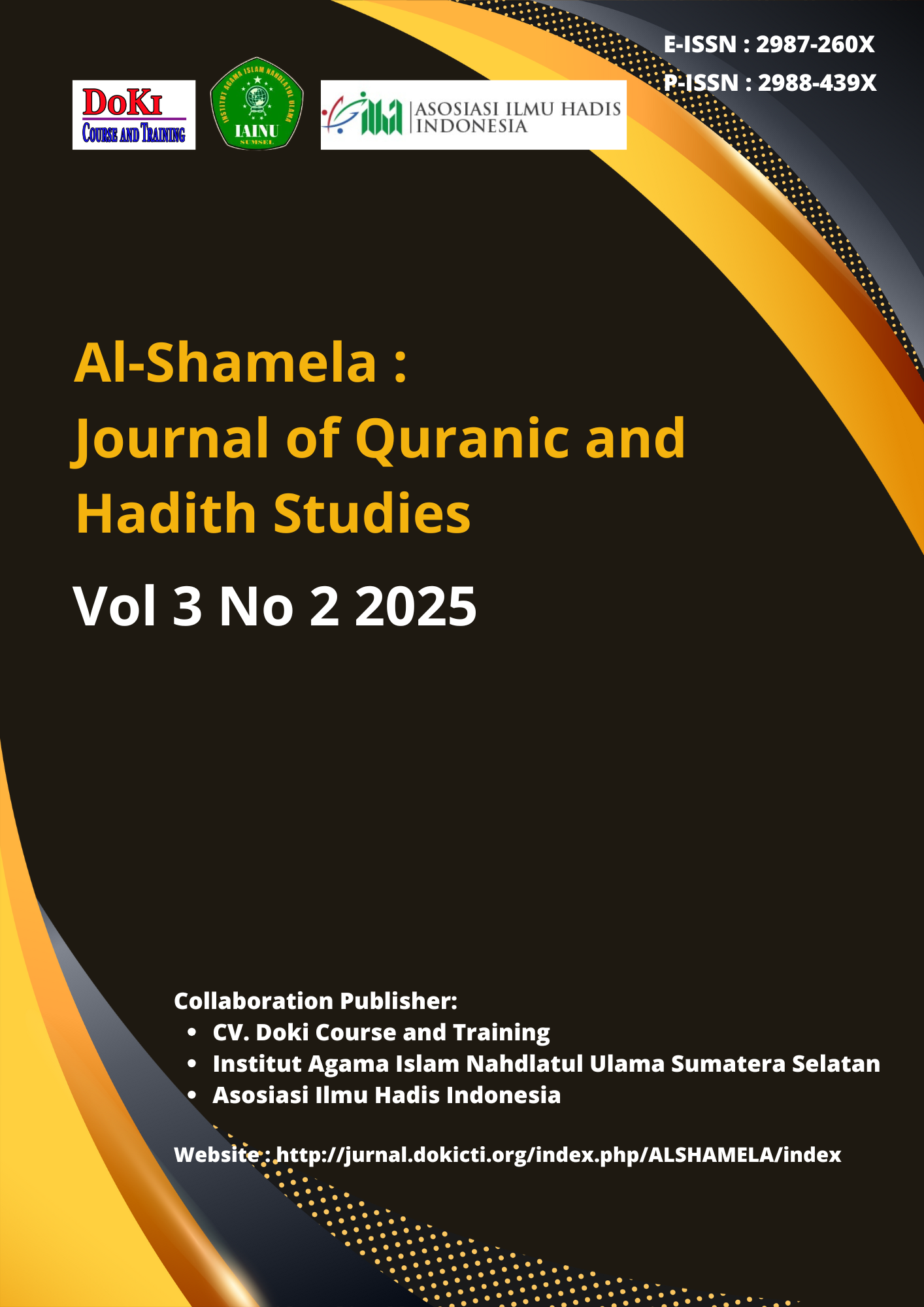The Construction of the Meaning of al-aql and al-qalb in Tafsir Mafatih al-Ghaib
DOI:
https://doi.org/10.61994/alshamela.v3i2.1210Keywords:
Tafsir, Reason, Heart, Ar-RaziAbstract
This study examines the role of reason (al-aql) and heart (al-qalb) in the Qur'an as cognitive and spiritual tools for humans. QS. al-Ankabut: 43 emphasizes the importance of reason in understanding divine parables, while QS. al-A'raf: 179 highlights human negligence in not using the heart to grasp the meaning of Allah's verses. The method used is analytical interpretation, through the perspective of Tafsir Mafatih al-Ghaib by Fakhruddin Al-Razi, which is known for its rational and philosophical approach. This study concludes that in Al-Razi's interpretation, reason is understood as an intellectual ability that enables scholars (al-'alimun) to interpret the parables of the Qur'an in depth through the process of ta'aqqul, which is holistic thinking that integrates rational analysis with revelatory guidance. Reason plays a role in assessing truth in the aspects of belief, law, and ethics. Meanwhile, the heart is the center of spiritual awareness (lathīfah rūḥiyyah), which enables humans to experience a spiritual journey (suluk), attain knowledge of Allah (wushul), and purify the soul from diseases of the heart (tazkiyah). Failure to use the heart causes humans to go astray, even becoming lower than other creatures. The findings of this study show that reason and the heart complement each other. Reason functions as a tool for rational analysis, while the heart is the center of internalization of spiritual values. An imbalance between the two, for example, relying on reason without purifying the heart, has the potential to produce a superficial understanding. The implications of this research are important for Islamic education, namely the integration of cognitive and spiritual development in the curriculum, as well as for contemporary life, by emphasizing the balance between reason and heart in facing modern challenges such as spiritual crises and the spread of disinformation.
References
Abdel-Maguid, Thoraya E. and Rabie E. Abdel-Halim. “The Qur’ān and the Development of Rational Thinking”. Urology Annals 7, no. 2 (2015): 135–140.
Afdhaluddin, Tsuluts. Akal Dalam Perspektif Al-Qur’an (Studi Komparatif Tafsir Mafâtîh Al-Ghayb Dan Jami’ Al-Bayân Fî Tafsir Al-Qur’ân). Skripsi, Universitas PTIQ Jakarta, 2024.
Al-Razi, Fakhrudin. Tafsir al-Kabir wa Mafatih al-Ghaib. Bairut: Dar al-Ihya’, 2000.
An Noor, Safdhinar M. et. al. “Rethinking Mu’âsyarah bil Ma’ruf: A Maqâshid Syari’ah Cum-Mubâdalah Approach”. At-Turas: Jurnal Studi Keislaman 11, no. 1 (2024): 12-24.
Arroisi, Jarman, Psikologi Islam: Membaca Anatomi Pemikiran Jiwa Fakhr al-Din al-Razi. Ponorogo: UNIDA Gontor Press, 2022.
Basith, Yudril. et al. “Optimalisasi Peran Pendidik Dalam Pendidikanmelalui Integrasi Potensi Qalb dan Aql”. Indonesian Journal Of Islamic Religious Education 2, no. 2 (2024): 215-230.
Erwanto, Dian. Metodologi Penelitian Tafsir Al-Qur’an. Yogyakarta: CV Bintang Semesta Media, 2023. https://bintangpustaka.com/toko-buku/agama-islam/metodologi-penelitian-tafsir-al-quran/.
Fatih, M. “Konsep Keserasian Al-Qur’an Dalam Tafsir Mafatihul Ghaib Karya Fakhruddin Ar-Razi: Perspektif Ilmu Munasabah”, PROGRESSA Progressa: Journal of Islamic Religious Instruction 6, no. 2 (2022): 1-18.
Ilmi, Miftah Nur. et. al. “Makna Qalb dalam Al-Qur’an Berbasis Tafsir Mafatih Al-Ghaib dan Neurosains”. Intelektualita 12, no. 2 (2023).
Irwana, A. S. “Analisis Hubungan Hati dan Akal dalam Al-Qur’an Surah Al-A’raf 179 (Analisis Penafsiran Hamka dalam Tafsir Al-Azhar)”. Tashdiq: Jurnal Studi Keislaman 2, no. 2 (2024).
Kamaruzaman, Amrina Rasyada. et al. “Qalb, Shadr dan Fuad: Satu Korelasi Mengikut I’jaz Bayani dan Tafsir al-Quran”, Malaysian Journal of Islamic Studies 7, no. 2 (2023): 37-48.
Manaf, M. F. B. “Qalb as the Center of Cognition and Spirituality in the Qur’an”. Journal of Islamic Studies 12, no. 1 (2015): 25–40.
Maulida, Husna. "Kajian Kitab Tafsir Mafātīḥ Al-Ghaib Karya Fakhruddin al-Razi". JIQSI: Jurnal Ilmu Al Qur'an dan Studi Islam 2, no 2 (2024): 121-140.
Mulian, Nur, Ahmatnijar Ahmatnijar. “Hubungan Akal dan Hati Dalam Al-Qur’an”. El-Thawalib 3, no. 1 (2022): 79–90.
Muliani, Nur. et al. “The Role of Qalb and Intellect in Understanding Al-Qur’an: A Study on Surat Al-A’raf:179,” Jurnal Studi Islam 18, no. 2 (2021): 45–60.
Napitupulu, Dedi Sahputra. “Elemen-Elemen Psikologi Dalam Alquran Studi Tentang Nafs, ‘Aql, Qalb, Ruh, Dan Fitrah”. Psikoislamedia: Jurnal Psikologi 4, no. 1 (2019): 57-71.
Noor, Fuad Arif. "Otak dan akal dalam ayat-ayat neurosains". Manarul Qur'an: Jurnal Ilmiah Studi Islam 18, no. 1 (2018): 115-140.
Nurjannah and Suyadi, “Integrating Neuroscience and Qur’anic Perspective on Intellect and Heart”. Journal of Religion and Science 10, no. 1 (2025): 15–30.
Pramita, Aldila Winda. et al. “Konsep Al-Qalb Dan Al-Aql”. Jurnal Kajian Islam dan Sosial Keagamaan 2, no. 3 (2025): 506-512.
Romdhon, M. R, Masruchin Masruchin. “Konsep Akal Menurut Fakhr Al-Rāzi dalam Tafsir Mafātīh Al-Ghāib”. KACA: Jurnal Dialogis Ilmu Ushuluddin13, no. 2 (2023): 226–241.
Sansayto, Tistigar. et al. “Konsep Ilmu Menurut Fakhr al-Din al-Razi”, Kalimah: Jurnal Studi Agama dan Pemikiran Islam 16, no. 2 (2018): 160-177.
Yunus, Firdaus M. et al. “Konsep Akal Menurut Perspektif Alquran dan Para Filsuf”. Ar-Raniry: International Journal of Islamic Studies 7, no. 2 (2020): 56–69.
Yusuf, Kadar M. Studi Al-Qur’an. Jakarta: Amzah, 2016.
Downloads
Published
Issue
Section
License
Copyright (c) 2025 Ahmad Humaidi, Dian Erwanto (Author)

This work is licensed under a Creative Commons Attribution-NonCommercial 4.0 International License.












